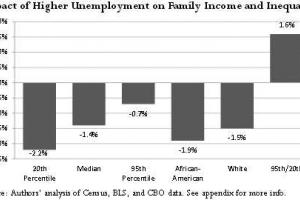5 Reasons Why a Debt Commission Is the Wrong Prescription
Center on Budget and Policy Priorities
 The biggest issue . . . is that this is a budget that will continue to impose a drag on the economy . . . While the stimulus approved by Congress boosted growth and added between 2-3 million jobs, the steep deficit reduction of the last three years has slowed the economy, costing millions of jobs. With the housing bubble gone, we are missing close to $1 trillion in annual demand and no mechanism in the private sector that will cause it to replace this demand on its own.
The biggest issue . . . is that this is a budget that will continue to impose a drag on the economy . . . While the stimulus approved by Congress boosted growth and added between 2-3 million jobs, the steep deficit reduction of the last three years has slowed the economy, costing millions of jobs. With the housing bubble gone, we are missing close to $1 trillion in annual demand and no mechanism in the private sector that will cause it to replace this demand on its own.
 The "deficit problem" is man-made. The deficit is now down 60 percent as a percent of gross domestic product. It is down more than the deficit hawks Alan Simpson and Erskine Bowles asked for. This rapid reduction is seriously hurting the economy and jobs, but demands for cuts continue. It is time for Congress and the President to "pivot" to focusing on our real problems: the jobs gap, the wage gap and the trade gap.
The "deficit problem" is man-made. The deficit is now down 60 percent as a percent of gross domestic product. It is down more than the deficit hawks Alan Simpson and Erskine Bowles asked for. This rapid reduction is seriously hurting the economy and jobs, but demands for cuts continue. It is time for Congress and the President to "pivot" to focusing on our real problems: the jobs gap, the wage gap and the trade gap.
Spread the word